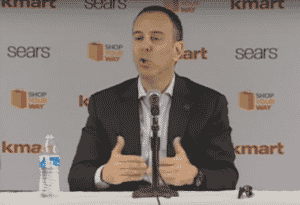When we reviewed the 2017 Leaders and Laggards “Naughty & Nice” list last month, we thought we’d see how our winners and losers are poised to make a splash in 2018.
These three represent the best… and the worst:
Leadership Leader

HEB is #12 on Forbes Largest Private Companies list, and #1 in Texas, with $23B in revenue and over 100K employees at 330 locations in the U.S. and Mexico. Founded in 1905 by Charles’ grandmother Florence, the company was named after his father Howard E. Butt, one of the Butt brothers. I freely admit to having an occasional chuckle at the sound of that last sentence. As my wife is fond of saying, you’re only young once but you can be immature forever. Moving on…

And here are some of those leadership “seeds:”
- HEB gives 5% of the organization’s pretax profits to charity.
- Charles is a Glass Door Top 20, with a 97% CEO approval rating.
- 85% would recommend HEB as a place to work—validated by their Net Promoter Score (NPS) of 55+, impressive for anyone who follows those things.
- The company culture and career advancement are most frequently named as reasons for that loyalty.

- Charles recently provided a $100M investment to create a new institute dedicated to training school principals and superintendents, focusing on leadership styles to boost student performance and talent development.
Charles’ right hand, COO Craig Boyan: “[HEB’s] success stems from its investment in its employees…” “It’s our goal to pay as much as we can, not as little as we can. It’s hard for some to understand… that those who invest more in their largest cost item — people — can be those that win.”

Besides, any CEO that has a company that has a mascot—a real mascot—has to be freakin’ amazing. It wasn’t a difficult decision, making Charles Butt and his HEB Triangle’s Leadership Leader of the Year.
Leadership Milquetoast

We had almost given up on United as a perennial Laggard, when Oscar Munoz started pulling them out of the gutter. His actions were so un-United-like that in February 2017 we declared him “Almost a Leader.”
After his horrendous April response to United’s man-handling of a passenger, he fell to Laggard status.
By September, with United still not being able to stay out of its own way, Munoz climbed back to the Milquetoast category with a common sense approach to adhering to self-imposed rules.
As 2017 came to an end, the only thing we were sure of is that he’s absolutely tone deaf when it comes to his customers and United’s investors.
For instance, during the third quarter earnings report, Munoz scared the crap out of analysts when he acknowledged the hole the airline had dug for itself. He said his management team was working on a plan for success. Really? Just now formulating a plan? That might be just after the nick of time. We weren’t alone in that assessment; United’s stock plunged more than ten percent that day.
When the flight attendants’ union joined the #metoo campaign, Munoz declared his support and said United needed to have a policy about sexual misbehavior. You think? That’s certainly not leading-edge thinking. He publicly joined the better-late-than-never club on preventing idiotic behavior.
And then there was December’s bump of a first-class passenger, innocently of course, so that a Texas congresswoman could sit up front. He said – she said aside, the airline’s response (blaming the passenger) certainly didn’t reflect the airline’s publicly declared “we care about our customers” mantra.

Hollow promises are the hallmark of a milquetoast leader, and we’ve decided that Oscar Munoz has been the milquetoastiest of Triangle’s Leadership Milquetoasts in 2017
Leadership Laggard
As much as we thought Steve Ells, former CEO of Chipotle and July’s Leadership Laggard winner, displayed poor leadership in 2017 during the continued outbreaks of various maladies at his restaurants, he didn’t make the Worst of the Worst cut. Maybe because he knew when to step down… better late than never.

We predicted a bankruptcy ‘I told you so’ moment if he didn’t change his ways, and his performance during 2017 didn’t disappoint – us, anyway. Fast Eddie loaned the company another $600 million to stay afloat in 2017, while Sears and Kmart closed another 358 stores (with 63 more closing this month).
Damn. What am I missing? Can someone tell me what Lampert’s game plan is?
Lampert, the hedge fund manager who engineered the merger of Sears and Kmart in 2005, has managed to lose the company more than $10 billion in the last six years. Lost SHC, that is, since his hedge fund controls Seritage Growth Properties, the REIT that Lampert spun off to own and manage the properties Sears and Kmart now lease. And with every closing, Seritage gets to lease the property to someone willing to pay more than Sears and Kmart are paying under the current structure.


For being worse than the worst of all our 2017 Laggards, we have to declare Edward “Fast Eddie” Lampert Our Leadership Laggard of the Year.

